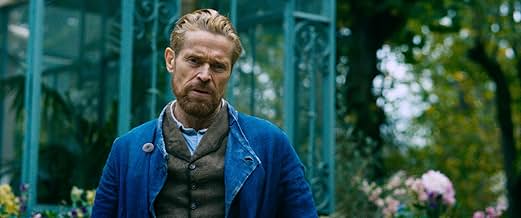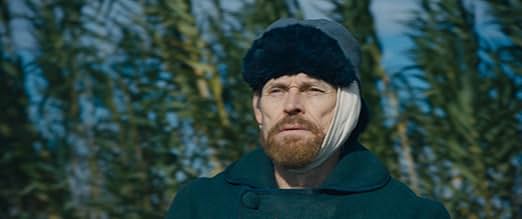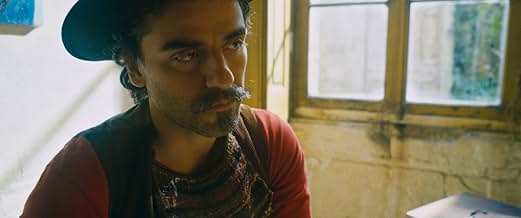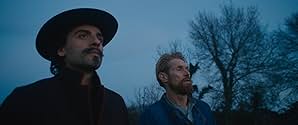Una mirada a la vida del pintor Vincent van Gogh durante el tiempo que vivió en Francia.Una mirada a la vida del pintor Vincent van Gogh durante el tiempo que vivió en Francia.Una mirada a la vida del pintor Vincent van Gogh durante el tiempo que vivió en Francia.
- Dirección
- Guionistas
- Elenco
- Nominado a 1 premio Óscar
- 3 premios ganados y 16 nominaciones en total
Clément Paul Lhuaire
- Emile Bernard
- (as Clément Lhuaire)
Alan Aubert
- Albert Aurier
- (as Alan Aubert-Carlin)
- …
- Dirección
- Guionistas
- Todo el elenco y el equipo
- Producción, taquilla y más en IMDbPro
Opiniones destacadas
The last years of Vincent van Gogh with his extreme sensitivity and mental instability. It's perfectly filmed with a colorful and adequate staging. And Willem Dafoe plays brilliantly!
Vincent Van Gogh's last days in the south of France are depicted in this heartfelt drama by Julian Schnabel. Willem Dafoe gives a powerful performance as the destitute, troubled painter who was not understood by those in his own time. As Van Gogh seeks to express his extraordinary eye for nature and portraits, those around him are either put off, wary or sometimes intrigued. His brother is his only real comfort.
A deliberately paced film with a mournful soundtrack, this will leave you in a contemplative state. It does not tell you everything about Van Gogh or when his self-isolation began but it does seek to offer insight into his profoundly troubled mental state. His demons are quite evident throughout the film- everything from his intolerant response to the curiosity of schoolchildren to his difficulty explaining his world to whatever doctor is examining him, Van Gogh is exemplified in Dafoe's anguished face. Schnabel, himself a painter, brings his own perspective in piecing this film together, especially in showing how Van Gogh paints and goes about his craft.
The film is not without drawbacks. Oscar Isaac is miscast as Paul Gauguin, the French painter whom Van Gogh couldn't bear losing company with. And Mads Mikkelsen gets minimal screen time in a very thoughtful performance as an inquisitive priest who recognizes Van Gogh's uniqueness. But this film is Schnabel's interpretation of Van Gogh and Dafoe's exemplary portrayal of him and in that regard it works quite well. Recommended.
A deliberately paced film with a mournful soundtrack, this will leave you in a contemplative state. It does not tell you everything about Van Gogh or when his self-isolation began but it does seek to offer insight into his profoundly troubled mental state. His demons are quite evident throughout the film- everything from his intolerant response to the curiosity of schoolchildren to his difficulty explaining his world to whatever doctor is examining him, Van Gogh is exemplified in Dafoe's anguished face. Schnabel, himself a painter, brings his own perspective in piecing this film together, especially in showing how Van Gogh paints and goes about his craft.
The film is not without drawbacks. Oscar Isaac is miscast as Paul Gauguin, the French painter whom Van Gogh couldn't bear losing company with. And Mads Mikkelsen gets minimal screen time in a very thoughtful performance as an inquisitive priest who recognizes Van Gogh's uniqueness. But this film is Schnabel's interpretation of Van Gogh and Dafoe's exemplary portrayal of him and in that regard it works quite well. Recommended.
This film succeeds in various ways: Dafoe delivers a marvelous portrayal of van Gogh, and Rupert Friend offers a dignified performance as Theo, his brother. The production design, costuming, and lush landscapes are all outstanding. As someone who has seen most of the films directed by Schnabel, I find him an insightful, astute director, yet I wish he would have introduced more nuance into certain scenes.
The invigorating piano score suffers from an overblown volume at various times. At the pre-release screening, more than a handful of people walked out of the film, midway. I think they were overwhelmed by a dizzy combination of loud music and jumpy, blurred camera techniques. As for me, the approach worked, adding a visceral punch.
Some of the dialogue was culled from Vincent's letters to his brother, and Dafoe rendered the text with a vulnerable immediacy. Several roles were aptly cast, but could have benefited from additional screen time: Isaac (as Gauguin), Almaric (Dr. Gachet), and Seigner (Madame Ginoux).
The invigorating piano score suffers from an overblown volume at various times. At the pre-release screening, more than a handful of people walked out of the film, midway. I think they were overwhelmed by a dizzy combination of loud music and jumpy, blurred camera techniques. As for me, the approach worked, adding a visceral punch.
Some of the dialogue was culled from Vincent's letters to his brother, and Dafoe rendered the text with a vulnerable immediacy. Several roles were aptly cast, but could have benefited from additional screen time: Isaac (as Gauguin), Almaric (Dr. Gachet), and Seigner (Madame Ginoux).
Loved the raw hand held camera work . The director shows the scene in such a that u can really enter into vincent's mind and can see his vision . Obviously the acting of Willem Dafoe was tremendous and he took the character to another level .
This film tackles the story of an artist creating masterpieces for later generations but not for his own. All the techniques that bothered other reviewers--the handheld camera, loud piano soundtrack, looped dialog--all emphasized a life of loneliness and ridicule that made the audience experience those emotions.
Clearly the story lacked a typical plot, not so much because it wasn't there as much as that Van Gogh's story is so well known and portrayed. I sensed that my companions may have been wishing they had chosen a different movie but for me this film further added to the tapestry of Van Gogh's unique story. Plus the film addresses the two biggest points of contention about him ... his ear and his death ... and suggests that Van Gogh's character traits have turned those into unsolvable mysteries.
Clearly the story lacked a typical plot, not so much because it wasn't there as much as that Van Gogh's story is so well known and portrayed. I sensed that my companions may have been wishing they had chosen a different movie but for me this film further added to the tapestry of Van Gogh's unique story. Plus the film addresses the two biggest points of contention about him ... his ear and his death ... and suggests that Van Gogh's character traits have turned those into unsolvable mysteries.
¿Sabías que…?
- TriviaWillem Dafoe was 62 when the film was released, 25 years older than Vincent van Gogh, who died at age 37.
- ErroresTheo tells Vincent at the hospital that he is now married. In reality Vincent received a letter from his brother on Dec 23rd 1888, in which he announced his engagement. Vincent feared that his brother would not be able to support him, once married. Additional to this he had the argument with Gaugin that night over Paul leaving. Mentally disturbed by all this he cut his ear off.
- Citas
Vincent Van Gogh: Maybe God made me a painter for people who aren't born yet.
Priest: Possibly.
Vincent Van Gogh: It is said, Life is for sowing. The harvest is not here.
- Créditos curiososThere's a mid-credits scene, where a Paul Gauguin quote is narrated.
- ConexionesFeatured in Sven Uslings Bio: 2019 Års sämsta biofilmer (2020)
Selecciones populares
Inicia sesión para calificar y agrega a la lista de videos para obtener recomendaciones personalizadas
- How long is At Eternity's Gate?Con tecnología de Alexa
Detalles
- Fecha de lanzamiento
- Países de origen
- Sitios oficiales
- Idiomas
- También se conoce como
- At Eternity's Gate
- Locaciones de filmación
- Productoras
- Ver más créditos de la compañía en IMDbPro
Taquilla
- Total en EE. UU. y Canadá
- USD 2,294,915
- Fin de semana de estreno en EE. UU. y Canadá
- USD 92,856
- 18 nov 2018
- Total a nivel mundial
- USD 11,519,666
- Tiempo de ejecución
- 1h 51min(111 min)
- Color
- Relación de aspecto
- 2.35 : 1
Contribuir a esta página
Sugiere una edición o agrega el contenido que falta





























